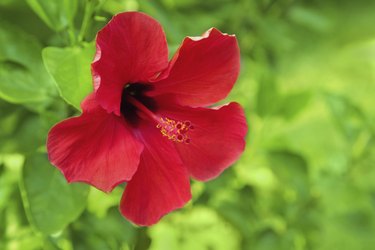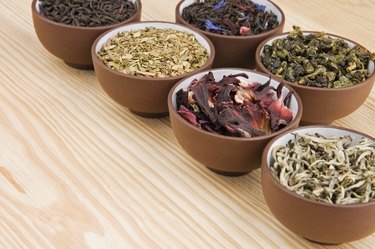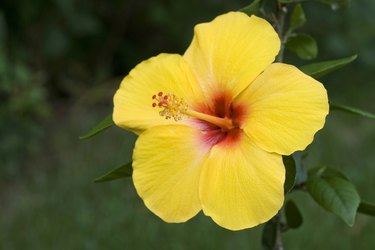
The colorful hibiscus flower is cultivated worldwide for both its aesthetic appeal and its medicinal uses, which are primarily in the form of tea. Although scientific research has been limited, studies suggest that hibiscus tea is beneficial with regard to several of its traditional uses, most notably helping reduce blood pressure and control cholesterol. Drinking hibiscus tea is relatively safe, but you should always consult a qualified health practitioner before consuming it for its medicinal properties, particularly if you are taking other medications or supplements.
Hibiscus Plant
Video of the Day

The hibiscus plant, Hibiscus sabdariffa, is a shrub that is thought to be native to Africa. It has yellow flowers with a red center, and should not to be confused with Hibiscus acetosella, the species of hibiscus that has red flowers. Hibiscus ascetosella is not used for medicinal purposes, while Hibiscus sabdariffa is used for a variety of ailments. Its flowers, fruit and calyx -- the cup-like structure that supports the flowers -- are all used for medicinal purposes, with the calyx utilized the most. The calyx is also used to make hibiscus tea, and is referred to as hibiscus or roselle in commercial trading. The fact that the calyx of Hibiscus sabdariffa is red is perhaps why it's confused with Hibiscus acetosella.
Video of the Day
Blood Pressure

Drinking several cups of hibiscus tea may help lower blood pressure, according to several studies. One such study, published in the July 2004 edition of "Phytomedicine," found that subjects who took an infusion prepared with 10 grams of dried calyx from Hibiscus sabdariffa for four weeks experienced reduced blood pressure, comparable to the results experienced by subjects taking the prescription medication captopril. Referred to as "sour tea" in Iran, hibiscus tea has traditionally been used to reduce blood pressure. A study published in the January 2009 "Journal of Human Hypertension" found some validity for that usage. The study reported that patients suffering from Type 2 diabetes who drank hibiscus tea twice a day for a month experienced a reduction in systolic blood pressure levels, although no reduction was noted in diastolic pressure.
High Cholesterol

One traditional use of hibiscus tea is for reducing blood viscosity, according to the Center for New Crops and Plant Products at Purdue University. In modern terms, that would mean a reduction in cholesterol levels. Although research has shown mixed results, several studies have indicated that hibiscus tea can help lower or maintain cholesterol levels. For example, a study published in the June 2010 "Phytomedicine" reported that patients who suffered from metabolic syndromes experienced a decrease in overall cholesterol levels after taking a daily dose of 100 grams of Hibiscus sabdariffa extract powder.
Other Uses

Both traditionally and recently, hibiscus tea has several other uses, although all of them have not been tested in clinical studies. One such use is to help maintain a healthy heart. Hibiscus contains flavonoids and anthocyanins, which have antioxidant properties and have been shown to support heart health. Hibiscus tea has also been used traditionally to treat coughing and poor appetite, and it has been used for its antibacterial and antifungal properties. In addition, drinking hibiscus tea may help with digestive orders, such as an upset stomach, as it can help relax the smooth muscle of the intestine.
- Gaia Herbs: The Surprising Health Benefits of Hibiscus
- Phytomedicine: Effectiveness and Tolerability of a Standardized Extract from Hibiscus Sabdariffa in Patients with Mild to Moderate Hypertension - A Controlled and Randomized Clinical Trial
- The Journal of Human Hypertension: The Effects of Sour Tea (Hibiscus Sabdariffa) on Hypertension in Patients with Type II Diabetes.
- Phytomedicine: Effects of Hibiscus Sabdariffa Extract Powder and Preventive Treatment (Diet) on the Lipid Profiles of Patients with Metabolic Syndrome (MeSy)
- American Botanical Council: Herb Profile - Hibiscus
- Purdue University, Center for New Crops and Plant Products: Roselle
- George Mason University: Medicinal Plants - Hibiscus, Roselle